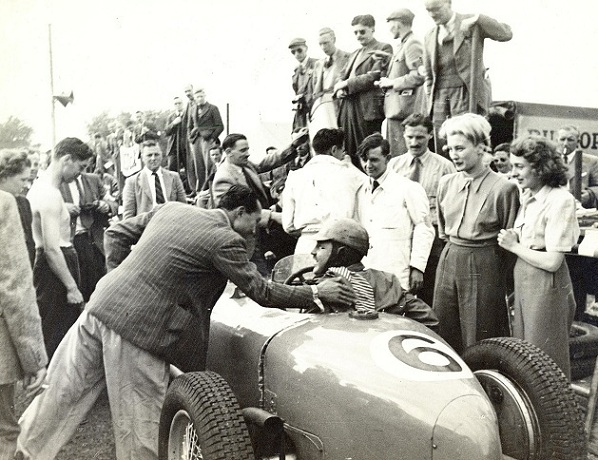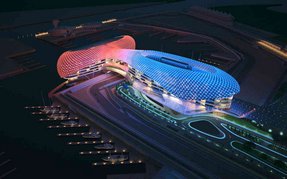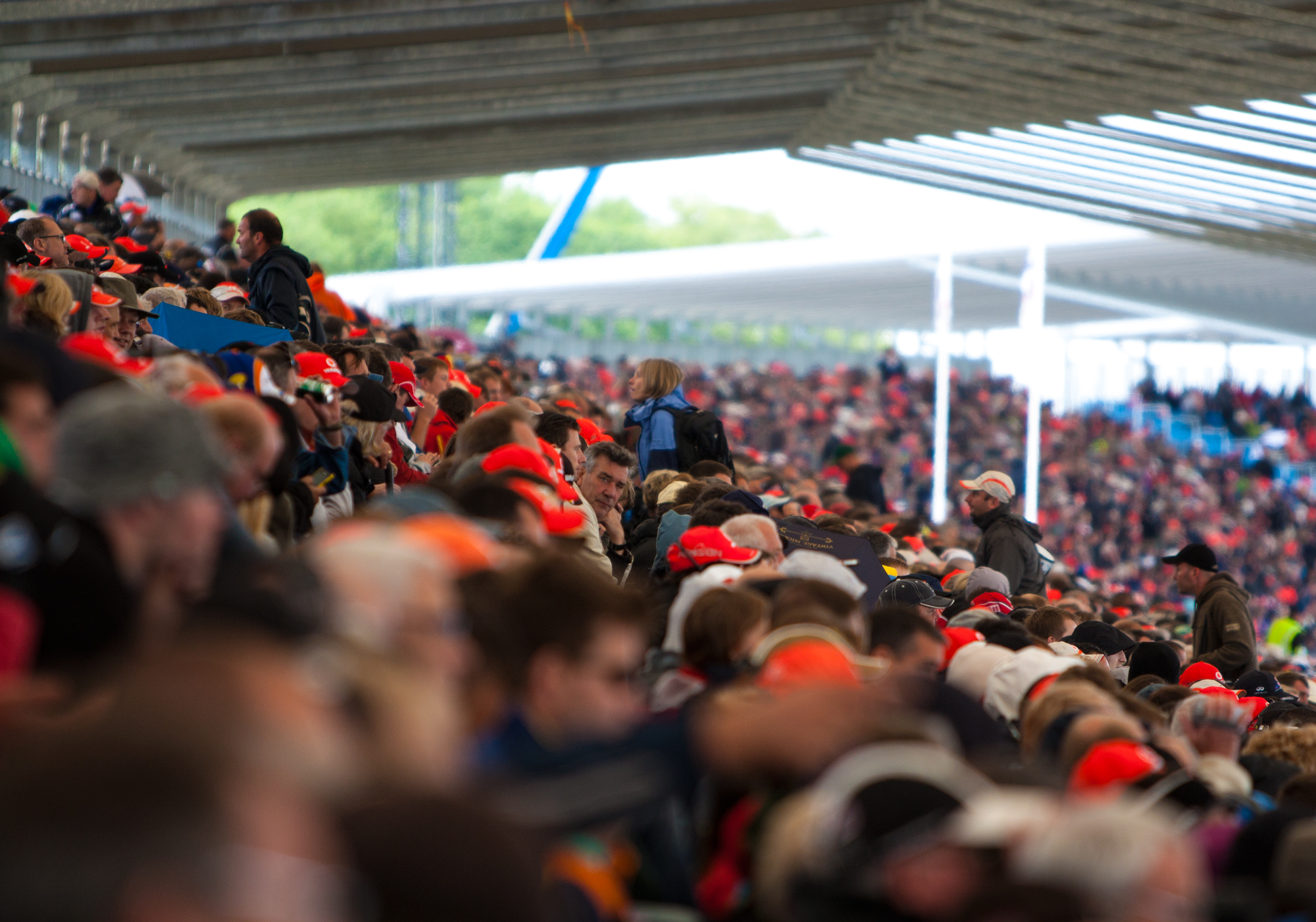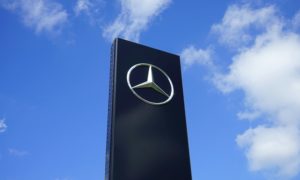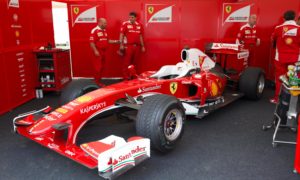PRESS CONFERENCE
Q: A question to you all. What lessons were learnt after Turkey two weeks ago? Can drivers’ problems be expected? Are they the sort of things that are regularly going to happen? Are there any ways of avoiding them? Eric, you are a newcomer to this would you like to start?
Eric BOULLIER: I think you should better start in the front row as they have a lot to say I guess about the drivers. I think for us it was pretty good. We had a good race from both drivers and nothing very much to say. We had the best weekend actually we have had this season in terms of pace.
Q: In terms of driver management though from what you saw in other teams was there something you might have changed?
EB: I think they managed the situation quite well. I think even if it was a very tricky one.
Q: Norbert, you were quoted as saying that it was a bit of a disaster’. What are your feelings about it?
Norbert HAUG: I think things like that can really happen. I know that from the past, probably not quite to that extent, but a big drama was made about it, but the reality was it was a bit of a misunderstanding. It can happen to us, that’s the reality. But of course if you are fighting for first and second place this is not what you want, probably not so problematic if you are seventh or eighth but first and second of course. Our McLaren Mercedes friends gave it a go afterwards, so it was really thrilling. But I can understand the situation at the top. At that speed it happens very quickly.
Martin WHITMARSH: I don’t think we learnt anything new from it. If you go back, and the historians are better than me, I think Indianapolis 2005 Norbert and I were working together and our drivers conspired to take each other out at the first corner. It can happen. We have got competitive racing drivers in most of the teams that are represented here. They want to go out there and race. Inevitably there are occasions when perhaps there is a conflict of interest between the driver’s personal ambitions and the intent of the team and things will happen on a race track which afterwards in the cool light of day you wish hadn’t. But they happen. They are part of motor racing and part perhaps of the rich entertainment we are here to provide.
Christian HORNER: Sorry, what was the question? I think Istanbul, there has been so much said about that event during the last couple of weeks. If you look at the race I think it was actually a very positive race for Formula One to have four cars running line astern for pretty much 40 laps with a very tight competition between two teams. It was a great shame that the incident happened, but it happened. You have got two guys tied on points in the World Championship, fighting for the lead in a grand prix and as team-mates, and you know is it wrong to let the drivers race each other?’ I don’t think it is. That’s what Formula One is about. We allowed the drivers to race each other and unfortunately an incident happened. You can always learn. I am sure the drivers have learnt, the team has learnt and as individuals we all learn from every grand prix weekend. The incident happened, it has been dealt with, it has been discussed and moved on. We have got two excellent drivers. They will be working with each other for another 18 months and they complement each other very well. We have achieved in the last, just over 12 months… we have had six one-two finishes with them. They have raced each other on numerous occasions wheel to wheel without any issue as we have seen on numerous occasions this year. I think answering your question; yes, lessons can always been learnt and are the guys going to race each other this weekend? If they qualify close to each other as they inevitably will do, then yes, they will, but hopefully they won’t find themselves in the situation they were in in Istanbul.
Q: To make it a little bit more specific for Martin and Christian. Is there anything you have changed since Turkey in terms of communication? As to some extent that was the problem with the McLaren team. Is there anything specific you have changed?
CH: Nothing specific. We just pointed out who the team-mate is. Things were discussed after the event in the coolness of an environment away from the race track. Both drivers regret that the incident happened, but most of all from a team point of view as we were set for an excellent victory having got into a dominant position ahead of the two McLarens. It was a great shame to lose a grand prix and a one-two finish in that manner. But lessons have been learnt and we have moved on.
MW: I think good clear accurate information is the right way to go. There were questions during that race. Someone responded quickly and intuitively. They made an error in doing that. I am sure that individual has learnt. I am sure we as a team have learnt. We will endeavour to get it right if we are asked for information next time.
Q: So in a way no specific instructions to that person that they must avoid doing this in the future?
MW: I think that particular individual is a very experienced person. He was asked for some information. I think he was trying to cause both cars to take it easy as all of the competitive cars in that race have an issue potentially of managing fuel, managing brakes, managing engines, managing tyres, and at that particular point we weren’t looking for our drivers to put at risk the prospects of finishing by pushing on the cars anymore than they had to.
Q: Norbert, are Mercedes at the moment living up to your expectations? Does the team need a big leap forward? Has the leap forward come here?
NH: We are definitely not where we want to be. That is no secret. We are aware of the situation. I think we had quite a good qualifying result in the last race, otherwise Michael (Schumacher) would have been fourth and Nico (Rosberg) would have been fifth because the cars behind up to 10th place or whatever had a comparable speed. We are working on it and we know that we have to improve. This will take some time and I think we could have done a very good job already in Monaco. The car was competitive there. It didn’t look too bad today, so let’s wait and see but we are fully motivated. We brought our people down to the right number for next year already. This is certainly not an excuse, it’s just an explanation. We are still learning. I think I am positive; we are positive. But we have to realise that we have very tough competitors around us and our Renault friends are catching up. I have to say they are doing an excellent job but probably the team looks like being Renault more than ever before. They are strong, have good drivers. We know how strong McLaren Mercedes is, Red Bull, Ferrari. It is not easy and the time will come. I answered that question very often in the past together with Martin, when will you be competitive again? We never can say an exact date, that’s for sure, but we will be competitive and we are working on it.
Q: So does it need a big leap forward? Is that big leap forward planned or is it just going to be little by little?
NH: Well, you know you need to be realistic and have a kind of worst case scenario. I could say we were five-and-half-tenths slower than the Red Bulls in the last race but I think it could have been the case that Sebastian Vettel would have been even quicker in qualifying and it would have been seven or eight tenths. That is the realistic gap. We did not post very good lap times at the beginning of the race. When the fuel came down at the very end I think it looked much better. Of course not everybody was pushing but I think Mark (Webber) for example pushed as much as he could at that stage, so towards the end with more grip and less fuel we did comparable lap times. But we are not where we want to be and if I could organise it for tomorrow I would like to have one-and-half seconds per lap but this takes time.
Q: Eric, is Renault beyond its expectations at the moment?
EB: Very frankly, we are in the expectation, maybe a little bit better. We are very happy to give some tough times to Mercedes. We need to work still a lot to give some tough times to McLaren or Red Bull but it is good to fight with Ferrari and Mercedes and we are happy with what is going on.
Q: You have got two very tough drivers. What do you think of the respective characters of your two drivers?
EB: I think we have two different scenarios. Robert (Kubica) is experienced enough and is pushing hard. He just needs to get a better car maybe to do better qualifying. In the case of Vitaly (Petrov) he still needs to learn, especially like this weekend. He has never raced here, so he has to learn the tracks and still needs to learn Formula One but Istanbul was a good example that with a little bit of experience he is getting the pace and he is getting a good race pace as well and he is able to keep the rhythm.
Q: A question to all of you. Felipe Massa and Mark Webber have both signed. Felipe until 2012 and Mark until 2011. What does that do to the driver market looking forward to next year?
EB: Definitely with the recent rumours about the link between Ferrari and Robert it is now closing all the rumours and I think it will not affect very much the driver market and we can now sit down and discuss properly with Robert his future with us.
NH: I think it is a perfect situation. Very rarely have we had such an intense fight. It was always a big fight, but I think the line-up is great and I think the first five teams probably will have the same driver line-up next year and that’s a perfect fit. That’s good for Formula One and I think we will see some very good races. Still this year, probably already on Sunday.
MW: Nothing to add really. Clearly the driver market is more stable than it normally is. The rumours are only starting to gather pace this time of year, so I think we have got other things to concentrate on. As Norbert said, I think we have got four world champions in top teams. We have got really exciting racing. The last six races have been really gripping and hopefully that will carry on for the rest of this year and into next season.
Q: Christian, obviously you have tied up your two.
CH: Yes. There is no effect at all for us as we have retained exactly the same pairing. It was a very straightforward decision to come to extend the agreement with Mark which was mutually extended on an annual basis. Mark is very keen that at this stage of his career he also takes things one year at a time. He has no aspirations to hang around Formula One past his sell by date, so we have got two very strong drivers that we are delighted to be working again with in 2011. I think most of the seats are fairly fixed going forwards, so I don’t think there is going to be in the front half of the grid too much movement.
QUESTIONS FROM THE FLOOR
Q: (Gaetan Vigneron RTBF) Question to all of you regarding the decision for tyres for next year. Jean Todt has said that it’s a decision of the FIA and of Bernie Ecclestone. What’s your opinion about that? It seems to be quite urgent, so when could we have a final decision?
MW: I think what Jean’s reflecting is that current regulations require the FIA to go out to tender and clearly that is something we all have a vested interest in concluding. I think teams, the FIA, the commercial rights holder have been working hard to reach a conclusion and I’m sure they will be able to shortly.
CH: I think the only thing to add is that the sole supplier situation that we have in Formula One has enabled independent teams such as ourselves to be competitive with automotive-owned teams and larger organisations. I think the most fundamental thing going forward is that we have equality of tyre supply. In the situation that we have at the moment, we have a good tyre supplier who unfortunately won’t be with us in 2011. I think the teams are clear where they want to go with the options that are on the table and hopefully the FIA together with Bernie Ecclestone can come to a similar conclusion.
MW: I think it’s urgent for whoever comes in. They need to get the tyres designed, developed and work out the logistics of manufacturing the number of tyres required and servicing Formula One next year and for the teams, we need it very urgently, so that we can design next year’s car, because clearly the tyre characteristics are a fundament starting point for the layout of next year’s car. So it’s pretty urgent really, for the tyre companies and for the teams.
Q: (MC) And are you going to want to test those tyres before the end of this season?
MW: I think the two companies that have been expressing an interest have got views on how they would test, whether they would test with teams or by other means but again, the quicker and earlier we can test and validate the design characteristics have been met and the things are safe the better. It’s going to be difficult. All of the teams, over the last couple of years, have now stood down their test teams, so none of us, frankly, are equipped to go out there testing and tyre testing as we did before. There have been a lot of initiatives in Formula One to reduce costs and I think we’ve got to be careful we don’t creep back in the wrong direction in dealing with this change, but I’m sure it’s something that together we will work through satisfactorily.
Q: (Daniel Bastien FM 103.3) Parallel to the tyre question there’s also the issue of KERS for next year and beyond. Where’s that now, is it multiple choice, single supplier?
MW: KERS is permissible under the regulations and of course, during the economic crisis there was an agreement amongst the teams not to run KERS this year. We were a team which benefitted greatly from a great and competitive KERS system last year. Certainly we haven’t been at the forefront of campaigning for its re-introduction but I think it would seem that there is sufficient interest from a number of the teams to be running KERS again, so it now seems likely that a proportion I don’t know if all of them but a good number of teams will run KERS next year.
EB: We are definitely a very strong supporter of KERS. I think we have said already many, many times that we would like KERS back. We have different technology, let’s say, to my neighbour Mercedes and this is maybe where we have some discussions to find a compromise but nothing else, just discussions. We hope that KERS will be back.
NH: Yeah, frankly we are very well equipped if KERS is needed. We had the historic first victory, as Martin pointed out, last year, just a little bit less than a year ago, with Lewis Hamilton in the Hungarian Grand Prix. We won two races with KERS last year, KERS helped us in Hungary. Without KERS, I think it would have been very difficult to overtake Mark Webber at that stage. If we need KERS we are prepared. We need to be aware that this will cost money for all the teams. Should only some teams run KERS and have a benefit, then it’s probably difficult but I think we all need to sit together and make the right decision, but Mercedes Benz is a pioneer, if you like to express it like that, in hybrid. In principal, we have a similar system in our Mercedes S-class which is a very successful car, interestingly very successful in China, this hybrid car. So it suits us basically; our point was just that we have to be aware that it costs money and we have to be aware that the new engine formula which is planned for 2013 will cost money and we should define limits, because Mercedes needs limits and money spending and I think Renault, whoever, I don’t think the other gentlemen here will see it differently. I don’t think anybody wants to spend more money than is necessary.
Q: (MC) Christian, would Red Bull develop their own or would they go with Renault’s?
CH: First of all, KERS is a very interesting technology, it’s something that Formula One needs to be responsible and look at. I think the problem that we have is that with the current regulations we find ourselves a little bit in no-man’s land concerning the performance advantage of running KERS, integrating it into the car, the weight, the system. Is it just going to be a benefit for the first 500 meters of the race, as we saw so often last year? Is it actually going to add anything to the spectacle, the sporting spectacle of racing? Unfortunately, with the current regulation it’s arguable as to whether it will. I think each team is going to have to make a decision, whether they optimise their car with a KERS system or without a KERS system and I think it is very, very tight as to whether you would or wouldn’t run a system. Then there’s obviously a cost element on top of that. It’s an interesting question that we have to make decisions on in the relatively near future, because the architecture of next year’s car… one has to decide fairly shortly, are you going to incorporate a KERS? You’ve also got to think about the size of your drivers, the weight limit has been increased to accommodate that to a degree. Weight distribution is affected by running KERS, there’s a knock-on effect adapting that system into your car is quite significant and of course there are gains and losses. You’ve just got to weigh up: does the system earn its place as a performance differentiator on your car?
Q: (Ted Kravitz BBC) Much of what was key to the Turkish Grand Prix were radio transmissions, especially between the McLaren drivers and the Red Bull drivers and the fact that they were delayed or never broadcast just added to the confusion of the controversy that’s rumbled on into this week. Would it not help people’s understanding of the race and Martin, you spoke about the entertainment that you’re here to provide if those transmissions were made open and accessible to broadcasters, not just to the FIA and FOM?
MW: Well, the radio transmissions are made available by all the teams to the commercial rights holder at all times. They then have the rights to use that in any way that they choose to. I guess the issue is how much can you process and refine and give to the outside broadcasters. That’s probably a discussion you need to have with FOM, not with us.
CH: From our point of view, all radio transmissions should be available and open. Certainly all our transmissions seem to be played, there was nothing that wasn’t played, because there was no communication given other than standard communications about managing fuel mixtures etc during the course of the race. But I think it’s something that Formula One has opened up much more in recent years. We never used to hear Ferrari transmissions, we never used to hear McLaren transmissions. We do hear that now and I think that adds to the spectacle, it adds to the show that is Formula One.
Q: (Ed Straw Autosport) Christian and Martin, there’s a ban on team orders in Formula One that was brought in after Austria to stop things like that farcical race finish with drivers switching around. Is there an argument for maybe re-evaluating the ban on team orders, both to allow people in your position to manage what your drivers are doing on the circuit, and also to prevent conspiracy theories rightly or wrongly being generated from what we do hear of radio transmissions?
CH: I think team orders are wrong. I think we’ve got two guys who we back equally and it’s down to what they do on the track. You employ professional drivers and we shouldn’t dictate how they drive the car. I think it would be wrong to deny the public from what a Grand Prix should be about which is man and machine competing with each other, and that’s a philosophy which we’ve always had and so I think it would be wrong to reintroduce the ability to dictate that one car should absolutely win from the first corner onwards.
MW: I think we’re happy with the regulations as they are. We haven’t been operating team orders and that’s been something in McLaren for many, many years. I know some teams have but I guess historically Formula One teams could run as a team. I don’t mind if other teams want to do something and that’s up to them, but within our team, we’ve tried to treat all of our drivers with respect. We try to treat them as fairly as we can at all times in preparing for a race and throughout a race. Having said that, you’ll never eliminate conspiracy theories; there will be a conspiracy theory on something else. I think it’s fine as it is.
Q: (Daniel Bastien FM 103.3) What do you think of Jean Todt’s suggestion that drivers should be sanctioned in the championship for behaving badly on public roads?
CH: I completely agree with it. I thought that used to be the case anyway. It certainly used to be the case that you had to have a valid road licence to hold a competition licence. The drivers are ambassadors for driving safely on the road. Certainly, I don’t think we would have any problem if that was reinstated.
MW: Yes, I agree with that, but we wouldn’t want to extend it to team members!
NH: Yes, it’s perfectly OK.
EB: Yes, definitely the drivers are ambassadors for safety and I don’t know how you can handle penalising them on track when they are doing something bad on the road. But they definitely need to behave because they have ambassador status.


